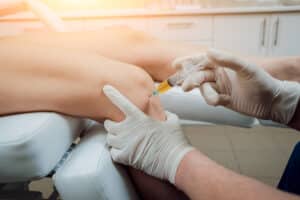
Orthobiologic treatments like PRP are one of the leading-edge options we use to help our patients recover without major surgery. For many, PRP provides an effective path to recovery, especially for certain types of injuries.
How Does PRP Work?
To understand the injuries PRP can treat, it’s important to know how it works first. Here’s a basic breakdown:
- Platelets and Growth Factors: Platelets play a key role in clotting blood and have proteins and growth factors that trigger the body’s natural injury response. With this treatment, we isolate your platelets and concentrate them into PRP.
- Healing Process: When injected into an injury site, PRP activates your body’s “mending mode“ more intensely than usual. PRP contains up to 10 times the usual amount of platelets versus whole blood. It concentrates the body’s natural restorative powers into the specific area where you need them, jump-starting a cellular repair process.
- Cell Attraction: The growth factors in PRP also draw in the body’s “master“ cells, capable of morphing into any cell type the human body makes. These master cells travel to the injured area to start rebuilding damaged tissue.
For example, when treating a sprained ligament, the body sends platelets to the area, which form a clot and initiate recovery. PRP magnifies this effect, providing a higher concentration of platelets, intensifying restoration, and speeding up recovery.
What Types of Injuries Can PRP Treat?
PRP therapy can effectively treat various orthopedic and sports injuries. Here are some common injuries we treat using PRP:
- Tendon Injuries: PRP can treat chronic tendon injuries, such as tennis or golfer’s elbow, rotator cuff injuries, and Achilles tendinitis.
- Ligament Injuries: Ligament tears and inflammation, such as that found in plantar fasciitis, may respond well to PRP.
- Cartilage Injuries: PRP can help promote cartilage regrowth to treat chronic joint pain, such as that caused by osteoarthritis.
- Muscle Strains and Tears: PRP can promote healing for muscle-related injuries, for example, strains.
PRP may also help with many other soft tissue injuries.
Book a PRP Treatment Consultation in Long Island
For more information about PRP or to schedule a consultation with our experts at one of our eight locations throughout Long Island, NY, call Orthopedic Associates of Long Island at 631-689-6698.